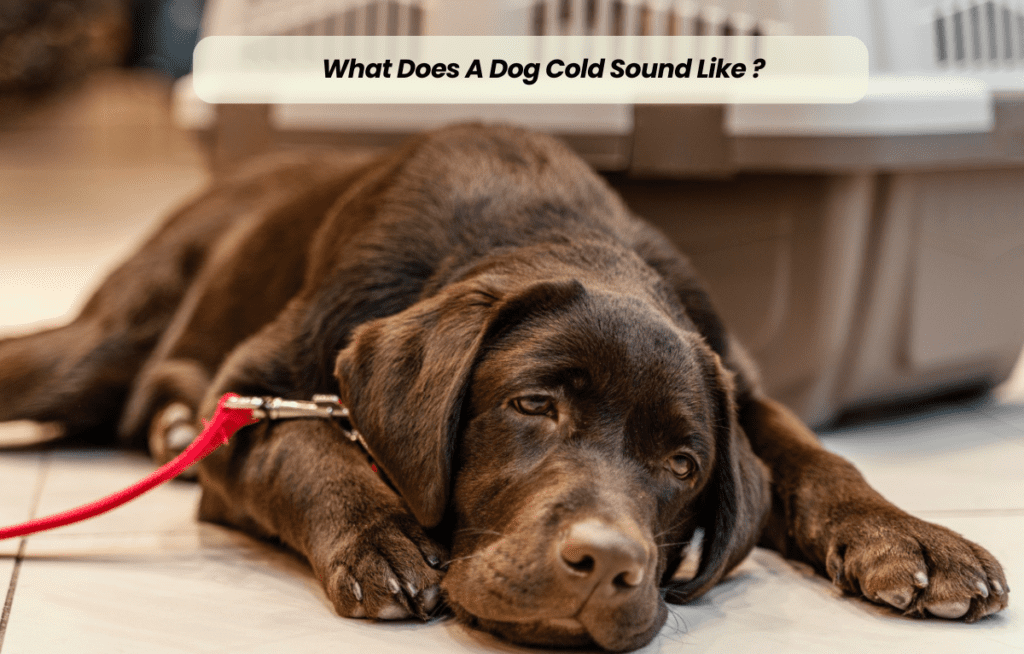It is scary when your furry friend is not feeling well. The dogs can get coughs and sniffles, but they actually can not catch the same kind of cold that humans do. Their cold and cough is very serious. Whenever the dogs start facing this issue, You should have to visit the vet along with your pet. If the dog is facing the issue of cold you also come to know What Does A Dog Cold Sound Like. Dive into the given information and learn more useful information about it.
It’s that season once more when colds, sniffles, and even the flu begin to spread in schools and offices. Tissues are a common sight, and many find themselves spending a few days in bed. Given how widespread these colds are among humans during winter. Furthermore, it is natural to question whether and how such viruses can affect our pets.
Symptoms of cold in Dogs:
Dogs also suffer from the seasonal cold. Their cold is severe and they take much time and strength to go through it. They need much strength to recover. Here are some symptoms of the cold in the dogs are given:
- Sneezing
- Coughing
- Runny and Congested nose
- Watery eyes
- Flu
These symptoms might be caused by kennel cough, dog flu, or even distemper. Play it safe and call your vet, especially if your pup also has appetite loss, fever, vomiting, diarrhea, or acts differently.
Cold or Kennel Cough:
Does your dog have sniffles and coughs? It might be cold, but more likely it’s kennel cough, which is contagious like a human cold but different. Kennel cough sounds like a goose honking and can make your dog tired.
See your vet if your dog is coughing, especially if they also have no appetite, or fever, or act differently. This way you can rule out anything serious.
Also Read : How long does a dog wear cone after neutering
How do dogs catch Kennel Cough:
Dogs can catch kennel cough like a doggy high-five gone wrong. It is caused by a combination of viruses and bacteria, often spreading in environments like kennels, dog parks, or places where dogs congregate.
The main culprits are the canine parainfluenza virus, Bordetella bronchiseptica bacteria, and sometimes other respiratory pathogens. These germs can spread through the air via coughing, sneezing, or direct contact with infected dogs or contaminated surfaces. Vaccinations are available to help prevent kennel cough, especially in high-risk environments.
Germ Warfare:
Kennel cough is caused by two main culprits. One is a bacteria called Bordetella Bronchiseptica and the other is the parainfluenza virus. When an infected dog coughs or sneezes. These tiny germs hit the airwaves like microscopic ninjas.
Inhalation Invasion:
Your pup can breathe these germs right in. It allows them to infiltrate their respiratory system and cause irritation.
Surface Survivors:
The germs can also linger on toys, food bowls, or any surface an infected dog has touched or been near. So, a playful sniff or a friendly lick on a contaminated object can be all it takes for your dog to catch kennel cough.
Hidden Threat:
Infected dogs can shed the germs for weeks, even if they seem healthy. This makes it tricky to pinpoint exactly where your dog picked it up.
Kennel cough is most commonly spread in places with lots of dog traffic, like:
Dog Parks:
A seemingly harmless playdate can turn into a germ exchange if another dog is infected.
Doggy Daycare:
Similar to dog parks, close contact with other dogs increases the risk of catching kennel cough.
Kennels:
As the name suggests, kennels are a breeding ground for kennel cough. Especially if proper hygiene protocols are not followed meticulously.
Symptoms of kennel cough usually appear within 3 to 10 days after exposure. If your pup starts coughing, especially after being around other dogs. It is best to consult your veterinarian to ensure they get the proper treatment and avoid spreading it to other furry friends.
When should you consult the vet for kennel cough:
You should seek advice from your vet regarding kennel cough. If your dog has been coughing persistently for more than three days without improvement if they show a loss of appetite, or if the coughing leads to vomiting.
In such cases, your vet may suggest using a cough suppressant or anti-inflammatory medication to the symptoms and improve your dog’s ability to eat and rest. Antibiotics are typically not prescribed unless your vet suspects a secondary lung infection, which is uncommon but possible.
FAQs: What Does A Dog Cold Sound Like:
How to tell if a dog has a cold?
When a dog has a cold, you might notice sneezing, a runny nose, licking their nose a lot, and watery eyes. They might seem more tired than usual. If your dog shows these signs, it is best to take shorter walks with them. After they have been outside in the rain. Make sure to dry them off with a towel and let them rest a lot.
What does a congested dog sound like?
You might notice your dog’s nose and airways sound congested. They might breathe heavily, quickly, or take sudden breaths. This can make them snore or whistle at times.
Do dog colds go away on their own?
Dogs don’t catch the common cold like humans do, but they can get other illnesses with similar symptoms. Most mild respiratory diseases in dogs will resolve on their own. However, pet owners must recognize the signs and take steps to prevent the spreading of these germs among dogs.
What does a sick dog sound like?
Coughing, wheezing, difficulty breathing, and nasal discharge are indications of a respiratory issue in dogs. These symptoms can vary from basic cold to conditions. Like canine flu, kennel cough, or even heart failure. A honking noise during breathing may suggest tracheal collapse. A condition often seen in certain small dog breeds.
Conclusion:
The dogs suffer from the same condition when they are ill. They suffer from the worst conditions as compared to humans. If your dog is coughing, particularly if they shows signs like a lack of appetite, fever, or changes in behavior. It is wise to see your vet. This can help rule out any serious underlying issues. I think this piece of information is enough for you. Stay tuned for the more recent updates.

